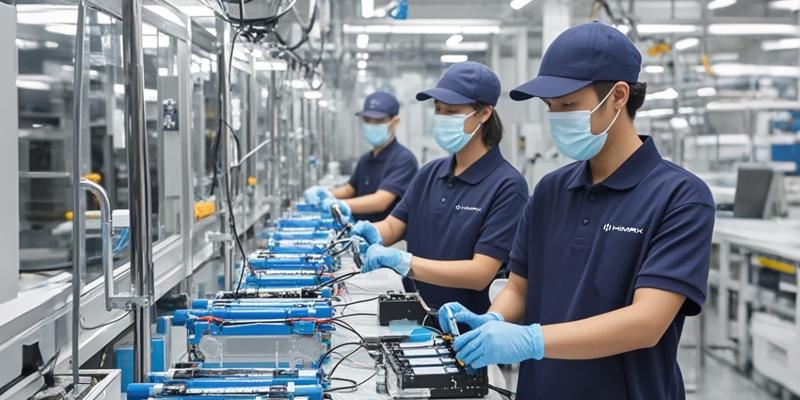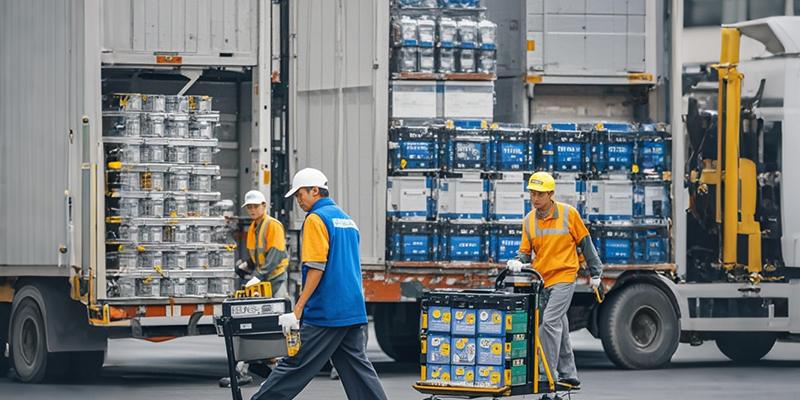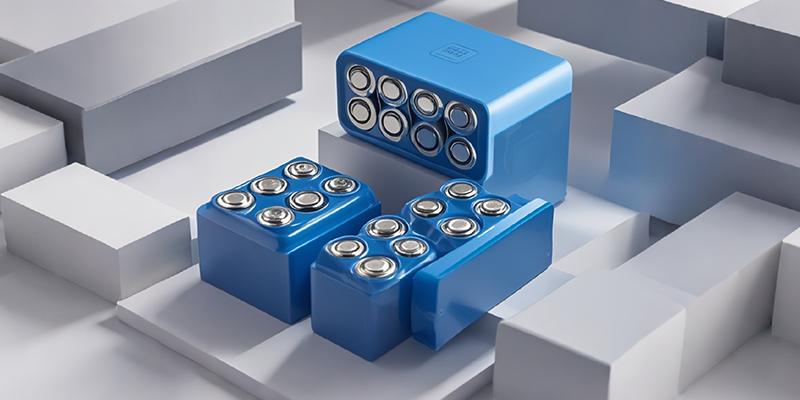Custom Batteries for Your Business: What to Know Before You Buy
Introduction
In today’s fast-paced and technology-driven world, the demand for reliable and efficient power sources has never been greater. For businesses across various industries, having a custom battery solution can make all the difference in product performance, customer satisfaction, and overall competitiveness. Whether you’re developing cutting-edge medical devices, innovative consumer electronics, industrial equipment, or renewable energy systems, understanding what goes into selecting the right custom battery is crucial. This comprehensive guide aims to provide you with the essential knowledge needed to make an informed decision when investing in custom batteries for your business.

The Advantages of Custom Batteries
Meeting Specific Application Needs
Off-the-shelf batteries are designed to cater to general requirements, which may not align with the unique demands of your products. Custom batteries, on the other hand, can be engineered to fit specific dimensions, shapes, and power requirements. This customization ensures seamless integration into your product design, eliminating the need for compromises or workarounds that could affect performance or aesthetics.
For example, a medical device requiring a compact yet powerful energy source can benefit from a custom battery designed to maximize energy density within limited space constraints. Similarly, industrial equipment operating in harsh environments might need batteries with specialized casings or components to withstand extreme temperatures, moisture, or vibrations.
Enhancing Product Performance and Reliability
The performance of a product is often directly linked to the quality of its power source. Custom batteries allow for optimization of critical parameters such as energy density, discharge rates, thermal management, and lifespan. By tailoring these factors to your specific needs, you can achieve longer run times, faster charging capabilities, and improved overall efficiency.
Moreover, custom batteries can incorporate advanced features like smart battery management systems (BMS), which monitor and regulate battery performance, provide real-time diagnostics, and enhance safety. This level of control and precision can significantly reduce the risk of failures and extend the operational life of your products.
Cost and Efficiency Optimization
While the initial investment in custom batteries may be higher than selecting standard options, they often lead to cost savings over the product’s lifecycle. Custom solutions can reduce maintenance costs by minimizing the frequency of replacements and repairs. Additionally, improved efficiency and reliability can lead to higher customer satisfaction, reducing returns and warranty claims.
By optimizing the battery design to match your application’s exact requirements, you also avoid over-specifying components, which can unnecessarily increase costs. Custom batteries enable you to strike the perfect balance between performance and cost-effectiveness.
Boosting Brand Competitiveness
In a crowded marketplace, differentiation is key to capturing market share. Products that offer superior performance, longer battery life, or enhanced safety features stand out to consumers and industry buyers alike. By integrating custom batteries into your products, you can offer unique value propositions that set your brand apart.
Furthermore, demonstrating a commitment to quality and innovation through custom battery solutions can enhance your brand reputation. This not only attracts new customers but also fosters loyalty among existing ones, providing a solid foundation for long-term business growth.
Factors to Consider Before Purchasing
Technical Requirements
- Battery Chemistry Selection
- The choice of battery chemistry is fundamental to meeting your product’s performance goals. Each type of battery chemistry has its own set of characteristics:
- Lithium-Ion (Li-ion):Known for high energy density and lightweight, making them ideal for portable electronics and electric vehicles. They have low self-discharge rates but require careful management to ensure safety.
- Nickel-Metal Hydride (NiMH):Offers moderate energy density and is more environmentally friendly than some alternatives. Commonly used in consumer electronics and hybrid vehicles.
- Lead-Acid:Durable and cost-effective, these batteries are suitable for backup power systems, automotive applications, and industrial equipment. They are heavier and have lower energy density compared to Li-ion batteries.
- Lithium Iron Phosphate (LiFePO4):A subtype of Li-ion batteries, offering improved safety and thermal stability, suitable for applications requiring high load currents and endurance.
- Selecting the appropriate chemistry involves considering factors like energy requirements, weight constraints, cost, and safety considerations.
- Capacity and Voltage Requirements
- Accurately determining the capacity (measured in ampere-hours, Ah) and voltage requirements is critical. Underestimating capacity can lead to insufficient runtime, while overestimating can result in unnecessary costs and weight.
- Capacity Calculation:Assess the total energy consumption of your device over the desired operating period. Consider peak loads and average power consumption to ensure the battery can handle the demands without degrading prematurely.
- Voltage Compatibility:Ensure the battery’s voltage aligns with your device’s electrical specifications. Using voltage regulators or designing battery packs with series or parallel configurations can achieve the desired voltage levels.
- Operating Environment
- Environmental conditions can significantly impact battery performance and longevity.
- Temperature Extremes:Batteries can suffer from reduced efficiency or damage when exposed to high or low temperatures. Custom batteries can be designed with thermal management solutions or use chemistries better suited for specific temperature ranges.
- Humidity and Moisture Exposure:For applications in humid or wet environments, batteries may need sealing or protective coatings to prevent corrosion and short circuits.
- Mechanical Stress:Vibration, shock, and pressure can affect battery integrity. Reinforced casings or flexible battery designs can mitigate these issues.
- Charging Requirements
- Consider how the battery will be charged:
- Charging Speed:Fast-charging capabilities may be necessary for some applications but can affect battery lifespan if not managed properly.
- Charging Infrastructure:Ensure compatibility with existing charging equipment or plan for the development of specialized chargers.
- Safety Features:Implement overcharge protection, temperature monitoring, and other safety mechanisms within the battery design.
Regulations and Certifications
- Safety Standards
- Compliance with international and regional safety standards is non-negotiable.
- UL (Underwriters Laboratories):UL certification ensures the product meets rigorous safety standards for electrical devices.
- CE Marking:Indicates conformity with health, safety, and environmental protection standards within the European Economic Area.
- RoHS (Restriction of Hazardous Substances):Ensures that the battery does not contain harmful substances like lead, mercury, or cadmium beyond specified limits.
- Transportation Regulations
- Batteries, especially lithium-based ones, are subject to strict transportation regulations due to potential safety hazards.
- 3 Testing:Batteries must pass UN38.3 tests to be legally transported by air, sea, or land. This includes assessments for altitude simulation, thermal tests, vibration, shock, external short circuit, and more.
- Industry-Specific Certifications
- Depending on your industry, additional certifications may be required.
- Medical Devices:Compliance with FDA regulations and ISO 13485 standards for medical device quality management.
- Automotive Standards:Adherence to ISO/TS 16949 for automotive quality management systems.
- Aerospace and Defense:Meeting MIL-STD specifications for military applications.
Supply Chain and Delivery
- Production Lead Time
- Custom batteries involve a multi-step development process, including design, prototyping, testing, and mass production.
- Design Phase:Collaboration with the supplier to finalize specifications can take several weeks.
- Prototyping and Testing:Building prototypes and conducting thorough testing is essential to validate performance and safety, potentially adding months to the timeline.
- Scaling Up Production:Once the design is finalized, ramping up to full-scale production must be planned carefully to meet demand without compromising quality.
- Minimum Order Quantity (MOQ)
- Suppliers often have MOQs to justify the costs associated with custom production.
- Negotiation:Discuss MOQs upfront and negotiate terms that align with your projected sales and inventory capabilities.
- Cost Implications:Smaller orders may result in higher per-unit costs due to the lack of economies of scale.
- Logistics and Storage
- Shipping Considerations:Batteries classified as dangerous goods require special handling during shipping. Ensure your supplier is experienced in complying with shipping regulations and can facilitate smooth delivery.
- Storage Conditions:Plan for appropriate storage facilities that maintain optimal environmental conditions to preserve battery integrity before installation.
Cost and Budgeting
- Total Cost of Ownership (TCO)
- Evaluating the TCO provides a more comprehensive understanding of the investment.
- Initial Costs:Include design fees, tooling costs, and the price per unit.
- Operating Costs:Consider energy efficiency, which affects electricity usage during charging.
- Maintenance Costs:Account for the expected lifespan, warranty coverage, and costs associated with replacements or repairs.
- Return on Investment (ROI)
- Performance Gains:Improved battery performance can lead to higher customer satisfaction and increased sales.
- Brand Value:Offering superior products can enhance brand reputation, leading to long-term financial benefits.
- Financing Options
- Explore financing or leasing options that suppliers may offer to manage cash flow and budget constraints.
How to Choose the Right Supplier
Experience and Expertise
- Industry-Specific Knowledge
- A supplier with experience in your industry is more likely to understand your unique challenges and regulatory requirements.
- Case Studies:Request examples of previous projects similar to yours.
- Technical Capabilities:Assess whether the supplier has the necessary engineering expertise and manufacturing technology.
- Innovation and R&D
- Suppliers investing in research and development can offer the latest advancements in battery technology.
- Patents and Proprietary Technologies:Suppliers with proprietary technologies may provide competitive advantages.
- Collaborative Approach:A supplier willing to engage in joint development efforts can result in more innovative and effective solutions.
Quality Assurance
- Manufacturing Standards
- ISO Certifications:Certifications like ISO 9001 (Quality Management Systems) and ISO 14001 (Environmental Management Systems) indicate robust operational processes.
- Testing Facilities:In-house testing capabilities ensure that batteries meet specifications and compliance standards before delivery.
- Traceability and Documentation
- Supply Chain Transparency:Understanding where materials are sourced can impact quality and compliance.
- Comprehensive Documentation:Detailed records of production processes, materials used, and testing results are essential for accountability and future reference.
Customization Capabilities
- Design Flexibility
- Engineering Support:A supplier with a strong engineering team can adapt designs to evolving requirements.
- Prototyping Services:Rapid prototyping accelerates the development process and allows for iterative improvements.
- Scalability
- Production Capacity:Ensure the supplier can scale production to meet your growth needs without compromising quality.
- Adaptability:The ability to adjust to changes in demand or specifications is crucial for long-term partnerships.
Customer Service and Support
- Communication
- Responsiveness:Timely and clear communication is vital throughout the development and production process.
- Cultural and Language Compatibility:Working with a supplier who understands your business culture and language can reduce misunderstandings.
- After-Sales Support
- Technical Assistance:Post-purchase support for troubleshooting and maintenance.
- Warranty and Service Agreements:Clear terms that protect your investment and provide peace of mind.
About Himax Electronics
With a rich history in providing innovative power solutions, Himax Electronics stands at the forefront of custom battery development. Our expertise spans across multiple industries, including medical devices, consumer electronics, industrial equipment, renewable energy systems, and more. We pride ourselves on delivering high-quality, reliable, and efficient battery solutions tailored to our clients’ unique needs.
Our Advantages
- Quality Excellence:At Himax Electronics, quality is more than a standard; it’s a commitment. Our batteries undergo rigorous testing and quality control processes, ensuring they meet and often exceed industry standards. We hold certifications such as ISO 9001 and ISO 14001, reflecting our dedication to quality management and environmental responsibility.
- Technical Expertise:Our team of experienced engineers and technicians brings a wealth of knowledge to every project. We stay at the cutting edge of battery technology through continuous research and development, enabling us to offer innovative solutions that enhance performance and efficiency.
- Comprehensive Support:We believe in building lasting partnerships with our clients. From the initial consultation to design, prototyping, production, and after-sales service, we offer end-to-end support. Our dedicated customer service team ensures that your questions are answered promptly and your concerns are addressed effectively.
- Successful Track Record:Over the years, we have successfully delivered custom battery solutions to a diverse range of clients. Our portfolio includes projects that have helped startups bring groundbreaking products to market and assisted established companies in upgrading their offerings.
Success Stories
- Medical Device Innovation:We collaborated with a medical technology company to develop a custom lithium-ion battery for a portable diagnostic device. The solution provided extended runtime and integrated smart features for monitoring battery health, contributing to the device’s successful launch and positive reception in the market.
- Industrial Equipment Enhancement:An industrial machinery manufacturer partnered with us to design durable batteries capable of withstanding extreme temperatures and mechanical stress. Our custom solution increased equipment reliability and reduced maintenance costs, leading to higher customer satisfaction.

Get in Touch
Your journey towards superior power solutions starts here. If you’re ready to explore how custom batteries can elevate your products and business, contact Himax Electronics today. Our team is eager to understand your needs and provide solutions that power your success.
- Email:sales@himaxelectronics.com
- Website:himaxelectronics.com
Conclusion
Investing in custom batteries is a strategic decision that can significantly impact your business’s success. By carefully considering technical requirements, regulatory compliance, supply chain logistics, and selecting the right supplier, you position your products for optimal performance and reliability. Custom batteries not only meet your specific application needs but also enhance your brand’s competitiveness in the market.
In a world where technology and customer expectations continually evolve, staying ahead requires innovation and excellence. Custom battery solutions offer the opportunity to differentiate your products, improve user experiences, and drive business growth.
Don’t leave the power behind your products to chance. Take the proactive step of partnering with a trusted expert in custom battery solutions. Reach out to Himax Electronics, and let’s power the future of your business together.



